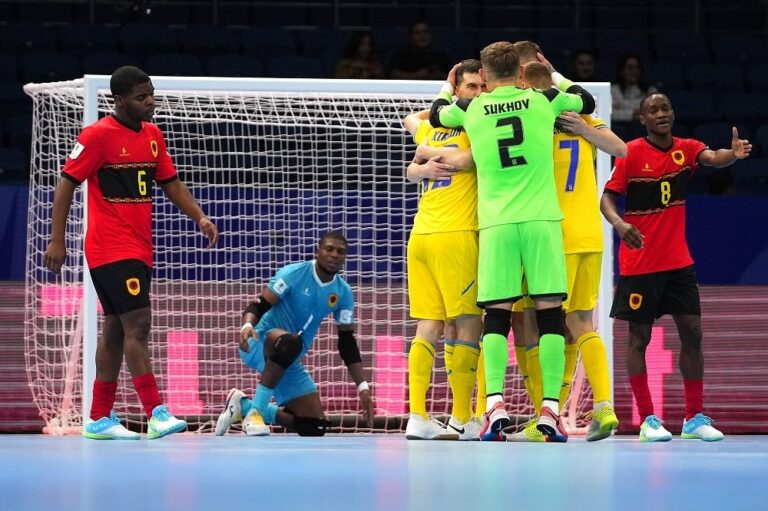The quarter-finals of the FIFA Futsal World Cup in Uzbekistan delivered exceptional drama and showcased the evolving tactical landscape of international futsal. These four matches determined the semi-finalists and highlighted significant shifts in playing styles and strategic approaches that defined the tournament.
Brazil’s Clinical Display Against Morocco
Brazil’s victory over Morocco at the Bukhara Universal Sports Complex demonstrated why they would eventually claim their sixth world title. The Seleção’s performance was a masterclass in efficiency, with Marcel opening the scoring early in the first half, followed by Leandro Lino extending the lead. Dyego sealed the victory late in the second half, before Morocco’s Boumezou managed a consolation strike.
This match perfectly illustrated Brazil’s tactical evolution, particularly their increased emphasis on pivot play. Marcel, who finished as the tournament’s top scorer, exemplified Brazil’s strategic approach where pivots accounted for a significant percentage of all their receptions among all tournament participants. Brazil’s pivots were responsible for over half of their goals throughout the tournament, showcasing their integral role in the team’s attacking philosophy.
Ukraine’s Offensive Masterpiece
The most spectacular quarter-final saw Ukraine demolish Venezuela at the Humo Arena in Tashkent, with spectators witnessing a futsal clinic. Abakshyn was the star performer with a hat-trick, scoring early and twice more in the first half. The Ukrainian attack was relentless, with additional goals from Shoturma, Shved, Semenchenko, Sukhov, Cherniavskyi, and Mykytiuk spread throughout the match.
Venezuela fought valiantly, with M. Francia scoring early, followed by goals from Viamonte, Vidal, and Morillo. However, they were completely overwhelmed by Ukraine’s attacking prowess. This performance was indicative of the tournament’s trend toward higher-scoring matches, with attacking-phase goals increasing significantly compared to previous tournaments.
France’s Historic Achievement
France’s victory over Paraguay at the Bukhara Universal Sports Complex marked a watershed moment for French futsal. France reached their first-ever FIFA Futsal World Cup semi-final, having never previously advanced beyond the group stage of any major tournament. Paraguay’s F. Martínez scored in the second half, but France’s resilience and tactical discipline saw them through to face Argentina in the semi-finals.
This breakthrough performance represented a significant achievement for European futsal, maintaining UEFA’s record of always securing at least three of the final-eight positions. France’s success was part of a broader European showing, with all seven UEFA representatives advancing from the group stage for the third time in four tournaments since expansion.
Argentina’s Dominant Statement
The final quarter-final witnessed Argentina’s emphatic victory over Kazakhstan at the Humo Arena, played in front of the largest quarter-final crowd. Kazakhstan, who had caused the tournament’s biggest upset by eliminating defending champions Portugal in the round of sixteen, found Argentina’s quality too overwhelming. Tursagulov managed to score for Kazakhstan in the second half, but Argentina’s superior technical ability and tactical execution proved decisive.
Kazakhstan’s remarkable journey to the quarter-finals, including their stunning victory over Portugal, exemplified the growing competitiveness of futsal globally. Their achievement in reaching the last eight represented one of the tournament’s most compelling narratives.
Tactical Evolution and Tournament Context
These quarter-finals reflected significant tactical shifts that defined the tournament. Teams spent considerably more time defending in low blocks compared to previous tournaments, with a substantial increase in low block/press phases and a corresponding decrease in high block/press phases. This tactical evolution contributed to the increase in attacking-phase goals, as teams found it easier to progress and circulate the ball against deeper defensive structures.
The tournament also witnessed a notable increase in first-touch finishes during open play compared to previous editions. This improvement in finishing quality was particularly evident during attacking phases, where a significant percentage of first-touch finishes occurred, substantially more than in previous tournaments.
Setting the Semi-Final Stage
These quarter-final results established compelling semi-final matchups: Brazil versus Ukraine and Argentina versus France. The matches demonstrated the global strength and tactical sophistication of modern futsal, with teams from four different confederations showcasing distinct playing philosophies and technical approaches.
Marcel’s goal tally after the quarter-finals positioned him as the tournament’s leading scorer, while Ukraine’s attacking display suggested they would be formidable opponents for Brazil. The stage was perfectly set for what would become memorable semi-finals, with Brazil ultimately defeating Ukraine and Argentina overcoming France, leading to a final that would see Brazil claim their sixth world title with a victory over Argentina.
The quarter-finals of the FIFA Futsal World Cup thus represented not just four individual matches, but a showcase of futsal’s tactical evolution, global competitiveness, and the sport’s continued growth in quality and entertainment value.

